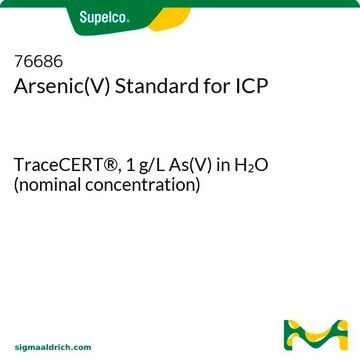200077
Arsenic(III) chloride
99.99% trace metals basis
Synonym(s):
Arsenic trichloride
About This Item
Recommended Products
Quality Level
Assay
99.99% trace metals basis
form
liquid
impurities
≤150.0 ppm Trace Metal Analysis
bp
130.2 °C (lit.)
mp
−16 °C (lit.)
density
2.15 g/mL at 25 °C (lit.)
SMILES string
Cl[As](Cl)Cl
InChI
1S/AsCl3/c2-1(3)4
InChI key
OEYOHULQRFXULB-UHFFFAOYSA-N
Looking for similar products? Visit Product Comparison Guide
General description
Signal Word
Danger
Hazard Statements
Precautionary Statements
Hazard Classifications
Acute Tox. 2 Dermal - Acute Tox. 2 Oral - Acute Tox. 3 Inhalation - Aquatic Acute 1 - Aquatic Chronic 1
Storage Class Code
6.1B - Non-combustible acute toxic Cat. 1 and 2 / very toxic hazardous materials
WGK
WGK 2
Flash Point(F)
Not applicable
Flash Point(C)
Not applicable
Personal Protective Equipment
Choose from one of the most recent versions:
Already Own This Product?
Find documentation for the products that you have recently purchased in the Document Library.
Customers Also Viewed
Our team of scientists has experience in all areas of research including Life Science, Material Science, Chemical Synthesis, Chromatography, Analytical and many others.
Contact Technical Service












